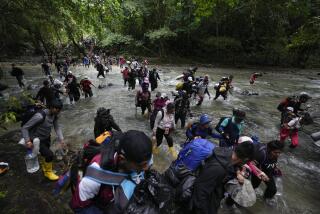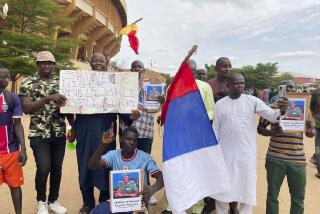‘Anarchy’ Seen if Noriega Stays On : Deep Splits in Panama Military Raise Risk of Bloodshed; Cuba Sends Arms
- Share via
PANAMA CITY — Dramatic splits in the Panamanian military have made the struggle to oust Gen. Manuel A. Noriega so volatile that “anarchy and a great deal of bloodletting” may result if the strongman does not step down, high-level sources with close knowledge of the Panama Defense Forces said Saturday.
But they said that Noriega still has the resources to hang on to power.
One of the unusually well-informed sources confirmed that the Noriega military has been bolstered in the last few weeks by an estimated 16 tons of Cuban arms and that paramilitary police units, some of them trained in Libya, have been expanded.
“I don’t think Noriega is ready to step down,” the source said, throwing cold water on speculation voiced Friday in Washington that the besieged military leader may seek exile in Spain within the next few days.
Look Inside Noriega Camp
The candid look inside the Noriega camp came in a rare “deep background” press briefing for more than 50 foreign journalists here. The sources, who normally keep a discreet distance from the press, spoke only on condition that nothing be directly attributed to them by name or nationality and that their information be credited to “personal observations gathered from many sources.”
The sources are known to have an intimate knowledge of the workings of the Panamanian military and to be deeply concerned about Noriega’s destructive influence upon it, but their motivation for staging the surprising briefing was unclear. At one point the source who conducted most of the briefing appealed to the journalists to report it fully in order to help in the struggle to get rid of Noriega.
Recalling Wednesday’s attempted coup d’etat against the military strongman, the source reported “dramatic fissures” in the Defense Forces and said he believes that “there is a pretty good chance” of another coup attempt if Noriega stands fast for another week against U.S. pressure to oust him.
“The situation tends towards anarchy and a great deal of bloodletting,” the source said.
He said that about a dozen Panamanian officers have been arrested or summarily retired in the wake of the coup attempt, which the source described as comically inept. He said that Noriega suspects many other officers--”the number may stretch to more than 100”--of being involved in or sympathetic to the failed coup.
“They turn out to be some of the best, the brightest and the most competent of the PDF (Panama Defense Forces),” he said. “What will be left is a structure composed only of people sympathetic to Noriega.”
But despite the apparent purge of all but the general’s trusted loyalists, the source said there remain some professional officers capable of staging a second coup. He cited in particular Col. Guillermo Wong, who was named intelligence chief when Col. Bernardo Barrera was implicated in the Wednesday coup attempt.
The effect of the Wednesday attempt, he said, has been “a significant rupture within the PDF.” Moreover, he said, dissatisfaction among officers has been compounded by Noriega’s disregard of the chain of command in giving orders to favored units that he believes he can trust, and by the absence of promotions during the past two years. He added that some of the enlisted ranks may also be unhappy over the prospect of being ordered to fire on fellow Panamanians.
One indication of the split within the military, the source said, is that “you don’t see many police on the streets, but you see troops of certain units.” Panamanian police are a part of the Defense Forces and were commanded until Wednesday by Col. Leonidas Macias, who was arrested for leading the unsuccessful coup. The conclusion, the source indicated, is that because of the involvement of their leader, Noriega no longer trusts the police.
“The situation is tending toward ever-increasing levels of more violence,” the source said. “It could light off at any moment.”
Ranging over many aspects of the situation in Panama, the source painted a picture of Noriega as a clever pragmatist who has been backed into a corner by U.S. economic pressure but who still has the strength to hang on, even though his struggle to retain power is damaging the country.
In addition to the Cuban arms, the source cited a Libyan contribution to the strongman’s power base. He said that Noriega’s non-uniformed paramilitary police, the gun-toting, shirt-sleeved units used in the past to break up street demonstrations, have recently been expanded and that some of them received training in Libya during the past two years. Each unit is composed of eight to 10 men, all strong-arm types recruited from civilian life, not from the military, and although they have operated in the past through the PDF chain of command, there now seems to be less control, he said.
Even if Noriega leaves, the source predicted “a very unstable period” here. He noted that most of the country’s institutions have been taken over by the military and that there appears to be no effective civilian leadership. The result, he said, could involve bloodshed when rival military figures compete for power within the Defense Forces and civilians struggle for positions in government. But he said he doubts that there would be any “unrestrained, unilateral military actions against civilians.”
Meanwhile, the government made plans Saturday to end a series of public employee strikes as well as shutdowns by businesses in Panama City. The government has declared a “state of urgency” that in effect permits it to suspend any and all constitutional rights in the country.
Throughout the day, Manuel Solis Palma, the country’s figurehead civilian president, met with economic advisers to outline ways to reopen ports and get utility workers back to their jobs. The employees have struck because the government has no money to pay their salaries.
Among measures under consideration are the sending in of troops to break unions that have gone on strike against the government. The government is also considering taking over chain stores that have closed during the political and economic crisis.
“We like to think of it as neutralizing groups that are doing national harm,” said presidential spokesman Jose Fernandez.
More to Read
Sign up for Essential California
The most important California stories and recommendations in your inbox every morning.
You may occasionally receive promotional content from the Los Angeles Times.










